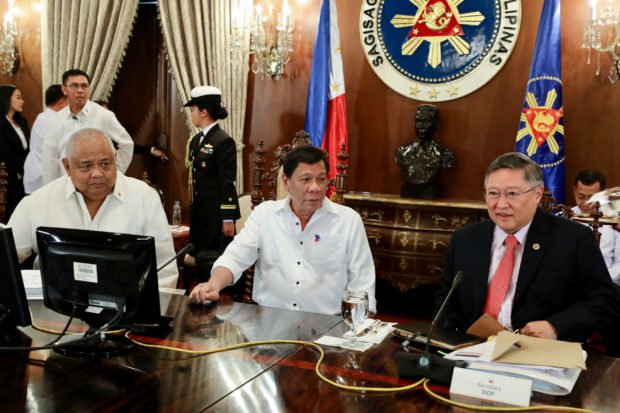Gov’t sets new fiscal calendar to avoid under-spending

President Rodrigo Roa Duterte presides over the National Economic and Development Authority (NEDA) Board Meeting at the Aguinaldo State Dining Room in Malacañan Palace on June 27, 2017. Also in the photo are Executive Secretary Salvador Medialdea and Finance Secretary Carlos Dominguez III. (PHOTO BY RICHARD MADELO/PRESIDENTIAL PHOTO)
MANILA — To avoid under-spending, economic managers have set a national government fiscal calendar that has laid down deadlines for agencies to meet planning and budgeting targets.
On June 30, Budget Secretary Benjamin E. Diokno, Finance Secretary Carlos G. Dominguez III and Socioeconomic Planning Secretary Ernesto M. Pernia issued Joint Circular No. 2017-1, which put in place the calendar that agencies have been mandated to follow in order to “strengthen the link between planning and budgeting through the establishment of a unified calendar of fiscal activities in the national government, complemented by a unified schedule of publications and reports.”
The calendar will “synchronize the schedule of the fiscal activities conducted by national government agencies, oversight offices and executive committee,” hence will “enable the public to hold the government and its agencies accountable for diligently implementing their fiscal responsibilities,” the three economic managers said in the circular.
Covered by the circular were all departments, agencies, bureaus, offices, commissions, state universities and colleges, government-owned and/or -controlled corporations, as well as other national government instrumentalities, they said.
The economic managers noted that “while large increases in maintenance outlays and capital expenditures are planned, underspending, especially in capital outlays, has been significant in the last years.”
Given that the Duterte administration wanted to ramp up spending on public goods and services to ultimately slash the poverty rate to 14 percent by 2022, the economic managers said they wanted to address the main culprit for underspending, which was “pervasive organizational weaknesses within national government agencies and GOCCs which hampered their ability to execute programs well and spend fast.”
Specifically, government agencies struggled with the following: bottlenecks in program or project implementation including difficulties in securing clearances or permits, coordination problems, right of way and other legal issues, delays in billing and approval of suppliers’ claims, as well as weak local government unit implementation capability; poor planning and program/project design, including delays in complying with preconditions for release; and procurement difficulties, including frequent bid failures, weak capacity and delays in finalizing specifications, as well as weak operational planning.
“Given these, there is a need to build up planning capacities to strengthen the link between the Philippine Development Plan (PDP), the strategic plans of the agencies and the budget; and improve and firm up agency operational plans prior to the commencement of the budget execution,” the economic managers said, referring to the PDP for 2017-2022, which targets 7-8 percent gross domestic product (GDP) growth in the medium term as well as reduce unemployment to as low as 3-5 percent by 2022.
PDP 2017-2022 was the first medium-term development plan anchored on the AmBisyon Natin 2040, an apolitical long-term vision aimed at making the Philippines a high-income country by 2040.
Based on the circular, all government agencies must review or assess their spending performance during the previous year as early as January, alongside submission of their proposals for the succeeding year to the Department of Budget and Management.
By March, the Cabinet must already approve the budget priorities framework as well as the sector ceilings for the next national budget, while the National Economic and Development Authority Board chaired by the President must approve the capital projects to be included in the budget proposal.
In May, the Cabinet-level, interagency Development Budget Coordination Committee must set the final medium-term macroeconomic assumptions and fiscal program for the budget year.
The proposed national budget for the next year must be approved by the Cabinet in June, such that the Office of the President can submit the proposal to Congress by July.
Following budget deliberations in the lower and upper houses of Congress from August to November, the succeeding year’s appropriations must be ratified and enacted.
As far as budget execution is concerned, the economic managers ordered agencies to start awarding contracts as early as January.
By August, agencies must already begin early procurement procedures for activities and projects intended under the following year’s budget.
Agencies are also required to submit monthly, quarterly and annual reports on various budget performance indicators to ensure accountability to spending. SFM
